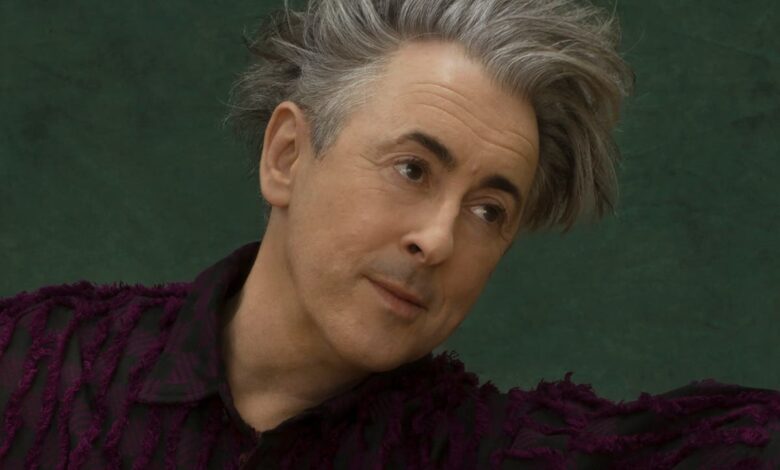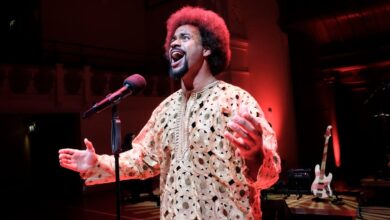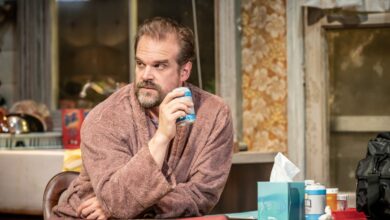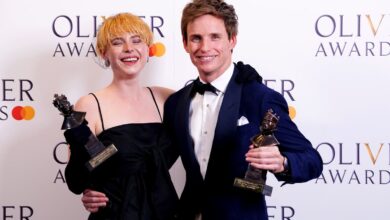Alan Cumming: ‘Men have a difficult time controlling our desire’

Alan Cumming wants us to know that we’ve got Robert Burns all wrong. The Scottish poet was not, he explains, “this strapping ploughman who just happened to knock off a few fabulous poems every now and then, and then shag everybody”. The truth is more complicated: “He was very fragile and delicate and a hot mess. Terrible things happened to him,” he says, running his hand through his flick of grey hair so that it stands up like a question mark. This summer, the actor is turning the life of his nation’s hero into a dance show for the Edinburgh International Festival. “And still my motto is: I dare!” said Robert Burns. It might be Cumming’s own.
He is, after all, making his dance debut at the age of 57 – something most would consider pretty daring. Burn is a piece of dance theatre choreographed by Steven Hoggett, who created the movement for Harry Potter and the Cursed Child, but it was Cumming’s idea. “It first started in 2015, when I finished doing Cabaret [for the second time],” he says, drawing out his words. “I had just turned 50 and felt I would never be that fit again in that way. I felt, ‘Oh God, this is it!’ – yet I felt I had got one more dancey thing left in me. That was the start of it. I put that out to the universe. I didn’t know it would be this…”
He grins broadly. We’re talking over Zoom, but his warmth and his humour fill the screen. The thing about talking to Cumming is that you ask him a question and he gives you an answer. It means conversation with him is always interesting, shooting in a hundred directions as his quick mind considers possibilities, even in the inimical setting of a timed Zoom call. He vacillates between serious and frivolous, as you’d expect from someone who has worked with both Stanley Kubrick and the Spice Girls.
He’s fearless, too, with a courage that makes him plunge into the unknown with giddy abandon. In his career to date, Cumming has played a flirty, dangerous Dionysus in a gilded kilt in The Bacchae, and presented a one-man version of Macbeth. He won an Olivier award for his performance in Accidental Death of an Anarchist, and a Tony in 1998 for his sexually ambiguous Emcee, both menacing and cheeky, in Sam Mendes’ dark, radical production of Cabaret. On television, he was Eli Gold in the long-running legal series The Good Wife, and the first gay leading character in a US TV network drama in Instinct.
In the last two months alone, he’s taken on the role of a reality TV host in the US version of a game show called The Traitors, set in a Scottish castle, and filmed the second series of the popular musical comedy series Schmigadoon! in Vancouver. It’s a trajectory that’s dizzying in its eclecticism, characterised by a desire to try something new.
He is clearly delighted at the idea of presenting himself as a dancer. In Baggage: Tales from a Fully Packed Life, a book full of raucous anecdotes, he describes the night when he invited the great Russian dancer Mikhail Baryshnikov out of the Cabaret audience to dance with him. Now he tells an even better story, about a subsequent meeting when he dressed up in one of Baryshnikov’s leotards as a joke – and discovered it was too tight for him. “I looked like an underwear ad,” he says, his voice rising and falling with comic emphasis. “It was hilarious. There are always these embarrassing situations, but what can you do?”
Actually, most people are probably better at avoiding them than Cumming is, but it is part of the zest-filled way in which he lives his life that he’s always tipping himself into situations that end up as a brilliant story.
He had been thinking about Burns for some time. “I wanted to make people put aside what I call the ‘biscuit tin’ version of him. I felt dance would be good for that, because the idea of me doing a thing in a different medium than you are used to helps you think differently about the content. I feel we don’t really know that much about Burns. He is an enigma.”
What is known is at odds with the sanitised version of the poet’s life. Burns spent most of his days in grinding poverty, which took its toll on his health and contributed to his death in 1796 at the age of 37. He was constantly unfaithful to his long-suffering wife, Jean Armour; she bore him nine children, the youngest of whom was born on the day of his funeral. He had four children with other women, and multiple affairs.
“I had also been thinking about how men struggle with their desire. I think men have a difficult time controlling our desire. I look at Burns and I see someone who couldn’t, and I looked at my father and I saw someone who couldn’t. I grew up thinking, ‘Oh well, your desire is such a part of your life force and your being that to suppress it is wrong.’”
He stops mid-thought and rolls back his sleeve. “Did I show you this?” he says, and puts his arm in front of the camera to reveal a tattoo that reads “Only connect”, EM Forster’s famous epigraph to his great novel Howard’s End. Forster was a gay man who hid his sexual identity; Cumming is an outspoken campaigner for LGBT+ rights.
“It’s not just about making sure you have a true connection with people, but also connecting your desire to the way you live your life. That’s something Forster couldn’t do, and I think he wrote eloquently about the sadness of that. I am fascinated about how men struggle and make a bit of a mess of it.”
The mention of his father takes us back to his upbringing, a story covered in his first autobiography, the bestselling Not My Father’s Son. The book, published in 2014, detailed the sadistic abuse he and his older brother Tom endured at the hands of their father, who was head forester on a country estate in Angus, Scotland. Years later the brothers confronted him and asked him to acknowledge his behaviour; he walked away. Remembering the moment on Desert Island Discs, Cumming recalled: “I’d faced my monster and felt so much more courageous than him. That is some succour and comfort.”
Now he notes: “It is just interesting, the difference between what my mother taught me and what my dad taught me. My mum taught me that there is no situation in life that will not benefit from kindness, and you should just be kind and thoughtful in how you interact with people, even if you’ve got to tell them something horrible, or even if you hate them. Being kind about how you communicate, and being honest. It will be better because of that.”
His upbringing stays with him in all he does. “I don’t buy into the Hollywood ending of life,” he says. “Trauma is always going to be with you. It doesn’t go away just because you go on a talk show or write a book about it. You just manage it better.”
Alan Cumming with Halle Berry in ‘X-Men 2’
He is proud of both books. Sharing both aspects of himself – the abused child, and the confident, successful, vivid man who runs a cabaret called Club Cumming – has “changed the narrative a bit”.
“Both those things of course exist. Neither is a falsehood. But neither is complete. In a funny way, it has been such a great thing for me to have written these books, because I do feel people have a very holistic view of me now – that you are able to be a fun-loving party boy or whatever, but also have great darkness.
“I do have fun, but I choose to live in a way that I don’t shy away from life. I don’t sit in dark rooms. I like the light. But I also have access to the darkness.”
His life now is split between the US and Scotland. “I feel I have got more connected to Scotland the longer I have lived away from it. Wanting to do a piece about a Scottish hero, with the National Theatre of Scotland at the Edinburgh Festival, is obviously a big deal for me. My Scottishness is very prominent in my make-up and my pride.”
I am fascinated about how men struggle and make a bit of a mess of it
It’s perfectly feasible that James Bond could be of colour. Being a woman is a little more tricky, because it’s written about maleness





